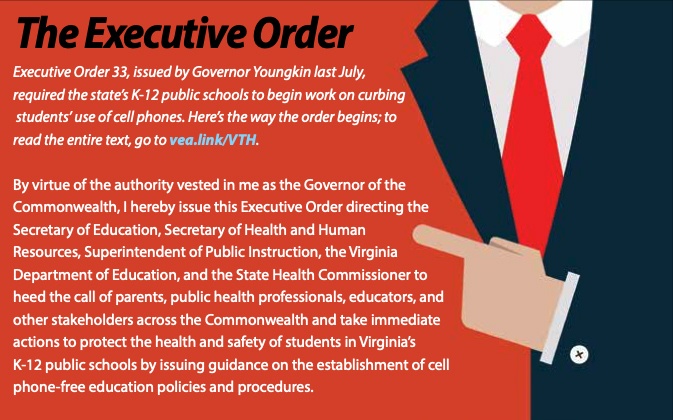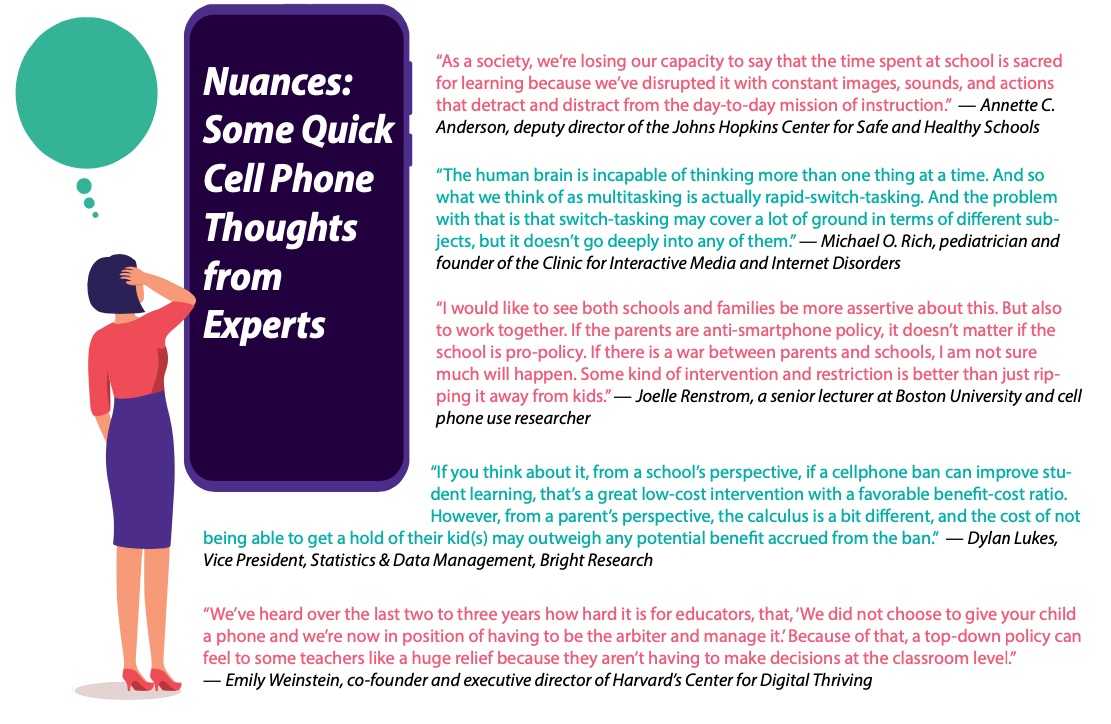Cell Phone Policies will only Work If We Do Them Right
April 24, 2025
April 24, 2025
By Tim Pressley and David T. Marshall
Students in today’s schools only know a world in which cell phone use is ubiquitous. They’re accustomed to using those phones to access information, contact a friend or family member instantly, play games, and a myriad of other things. There are undeniable benefits, but research has also documented concerning trends in cell phone use among young people. Youth and adolescent mental health were trending downward prior to the disruptions caused by COVID-19, and those trends were only exacerbated by the pandemic. Research from NYU social psychologist Jonathan Haidt, San Diego State psychology professor Jean Twenge, and others have observed that the downward trends began around the time cell phone and social media use became commonplace among children and teenagers. The Centers for Disease Control and Prevention’s recent survey of youth and adolescents found that more than three-quarters of students reported frequent social media use, which has been linked to students reporting feelings of sadness and hopelessness, as well as an increased risk of suicide.
The pandemic also significantly contributed to a decline in academic success. Cell phones likely played a part, too, as noted in a study by the Organization for Economic Co-operation and Development, which found that excessive cell phone use in classrooms leads to increased distractions, reduced attention spans, and lower student engagement. All of that negatively affects academic performance, and none of it come as a surprise to educators. These findings align with the latest NAEP results, revealing that students continue to struggle in reading and math, emphasizing the urgent need for policies that minimize distractions and refocus students on learning.
Last July, in an effort to promote more focused and distraction-free learning environments, Governor Youngkin issued an executive order directing school divisions to craft and implement policies banning cell phone use at school from bell to bell (see “The Executive Order” on page xx). As students and educators returned to the classroom in January, the new policy went into effect for all Virginia schools and, while some schools began new cell phone policies last fall, this was new for many others. To learn more about how teachers felt about cell phone bans in their classrooms, we partnered with a Virginia school division to study its impact, asking middle and high school teachers’ perspectives on the executive order and how it may impact their classrooms. The information we gathered, we believe, provides valuable insights from teachers on what they need for cell phone policies to be effective and how they might inform future decisions regarding the use of technology in educational settings.
Virginia is not the first state to take such steps; others have adopted similar policies, with positive results. Early evidence from schools in places like New York City suggests that policies banning cell phones work: student academics improved to pre-pandemic levels, and student engagement and mental health also improved. Though the policies were limited to in-school time, a charter school in New York City found that after-school extracurricular activity and high school sports attendance were also up 50 percent. Likewise, several school districts in California and Massachusetts have implemented bans, with teachers and administrators noting improvements in classroom behavior and overall learning environments. These success stories suggest that limiting cell phone use in schools can have widespread benefits, reinforcing the potential impact of Virginia’s policy.
Cell phone policies have also polled well with teachers. According to a 2024 National Education Association survey of its members, 90 percent of teachers supported prohibiting cell phones during instructional time, while 83 percent supported banning cell phones for the entire day. However, at the same time, a November 2024 EdChoice/Morning Consult poll found that 67 percent of parents believed children should be allowed to have cell phones in school. Those viewpoints, which put educators and parents at odds, can potentially undermine the success of cell phone policies. As a case in point, a school in Gary, Indiana banned phones last year, initially only during instructional time. Though there was some marginal improvement in the classroom, the fact that phones were still prevalent in school meant that online drama continued to negatively affect school climate. A few weeks later, school leaders revisited the policy and extended the ban to encompass the entire school day. This move yielded positive results for students’ academics, social and emotional well-being, and for the climate of the school overall.
Last November, we partnered with a Virginia school division, inviting all its middle and high school teachers to complete a survey to serve as baseline data before a cell phone policy went into effect. The sample included 124 teachers, representing four middle and three high schools. Three of the schools (two middle and one high school) had already implemented cell phone policies. However, these policies were not as strict as those described in Executive Order 33. Among the teachers we surveyed, 78 percent shared that cell phones are distractions in their classroom and 84 percent believed the new cell phone policy would be appropriate for their school. In short, most teachers see the need for cell phone measures to be taken and approve their school’s plan to do so.
While the data show that teachers support their school division’s plan, they also shared a central concern: if these policies are not implemented and enforced consistently, with clearly communicated consequences, they will fail.
Survey respondents were concerned that insufficient backing from school leaders could lead to difficulties following through on cell phone policies in the classroom. A middle school teacher said, “Weak administrative support for enforcement of the cell phone policy will only lead to more issues and additional work for teachers.” Similarly, a high school teacher expressed concerns about enforcing the executive order due to the current climate of student and parent involvement in school: “I am mostly concerned about student and parent pushback. Students are generally more argumentative now than they used to be, so enforcing the policy will likely be difficult.”
Teachers also had concerns about the effective implementation of the policy, particularly regarding communication and consequences. One high school teacher said, “I believe we need a discipline expectation. What will happen after a violation? A second? A third? This needs to be [universally understood] and explicit.”
A small minority of teachers were concerned about the ban hindering their ability to use technology effectively in their instruction. A high school teacher said, “I don’t have issues with cell phones in my classes…my biggest concern is that many times their school-issued devices are blocked by IT [regarding what sites can be accessed, and this leads to] activities I have planned for class [not working].” Additionally, a small number of high school teachers believed that students need to learn how to self-regulate cell phone use as such devices are a constant distraction in the real world and that a policy banning such devices wouldn’t benefit students in that sense.
While cell phone usage policies had overall support from teachers, they spelled out caveats, among them the need for explicit guidelines for the consequences of violating the policy. They want a clear, consistently applied disciplinary framework. Further, ongoing communication between school leaders and students and parents about the policy’s importance is essential to getting buy-in from everyone, given the level of parental questions. As a middle school teacher put it, “It is vital that teachers have strong administrative support and sufficient administrative consequences in place for students who violate the policy.” A high school teacher had similar thoughts: “I would like to see the implementation of consequences for breaking the policy. This includes students but also accountability for teachers. It would be helpful if the administrators could set the tone in the hallways and take phones, too.”
Another high school teacher added, “I have concerns regarding the effective implementation of the state-mandated cell phone policy. I believe that if the administration and the district take a proactive approach by thoroughly informing parents about the policy and emphasizing its importance to students, this will significantly enhance compliance.” This teacher went on to share the importance of students hearing the message from school administrators: “When students receive clear communication from the administration regarding the seriousness of the policy, they are more likely to understand and adhere to the new regulations. Currently, it can be quite stressful for teachers when students question the policy, especially if they have not received adequate information from the administration or district. As educators, we are often left to enforce rules without the necessary support or backing from school leadership.”
In addition to support from school administrators, teachers shared that they also want it from their colleagues. They want other teachers in the school to buy into the consequences of the cell phone ban, not see it as a mandate adding another responsibility to their plate, which could lead to inconsistent enforcement.
Others expressed concerns about losing the ability to leverage technology to support learning. One high school teacher shared with us, “My only concern [with the policy] is the lack of technology we have to support student learning. While I support the cell phone ban, I believe we must have adequate, state-of-the-art devices to fill the void banning cell phone use for instructional purposes will create.”
These insights underscore that while most think cell phone policies are a step in the right direction, their success hinges on thoughtful, consistent implementation and robust support structures. The concerns voiced by teachers provide a roadmap for addressing potential pitfalls and ensuring the policy achieves the intended outcomes. As a high school teacher noted, “There needs to be widespread support [of] teachers for this policy. While I am so excited about what this means for getting learning back on the right track, I’m very concerned that teachers will be too tired to buy in. As in any new mandate, all the onus falls on the teacher. If we don’t have the complete support of the administration, security, school resource officers, and all adults in the division, this new policy will leave the teachers to battle with students on cell phones singularly.”
Removing cell phones from the classroom has the potential to make the learning environment more focused, engaged, and academically productive. That’s just on paper, however: Making cell phone policies work will come down to how they are implemented, communicated, encouraged, and enforced.
Tim Pressley is an associate professor of psychology at Christopher Newport University. David T. Marshall is an associate professor in the College of Education at Auburn University and has earned degrees from Virginia Tech and Virginia Commonwealth University.

One Virginia educator, who requested anonymity, supports cell phone policies in schools but is also concerned about potential dilemmas facing staff members because of such policies:
It seems clear that students shouldn’t be allowed to have cell phones in schools: Such devices get in the way of learning and keep children from performing at their best. Some parents/guardians argue that students need their phones for emergencies or to protect themselves from adults in the building (even encouraging their children to video staff members). But it’s not a child’s job to police educators. It’s a job for school policies, which protect students and hold educators accountable. Removing phones from schools removes barriers to education. That said, there are also serious challenges presented by no-phone policies. Teachers aren’t looking to police their students, either. Some may hesitate to confiscate phones because they don’t want to be the only ones following the rules and become “the bad guy,” or because they don’t want to complicate relationships with both students and parents/guardians—many of whom want their children to have access to phones. It’s going to be a fine line for teachers to walk, particularly if they don’t get strong, consistent support from administrators.

According to a American Library Association survey, 67% of voters oppose banning books from school libraries?
Learn More